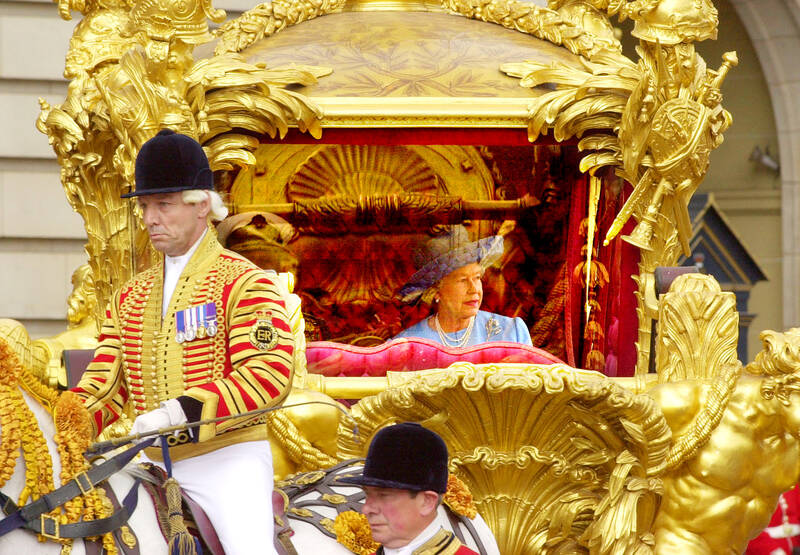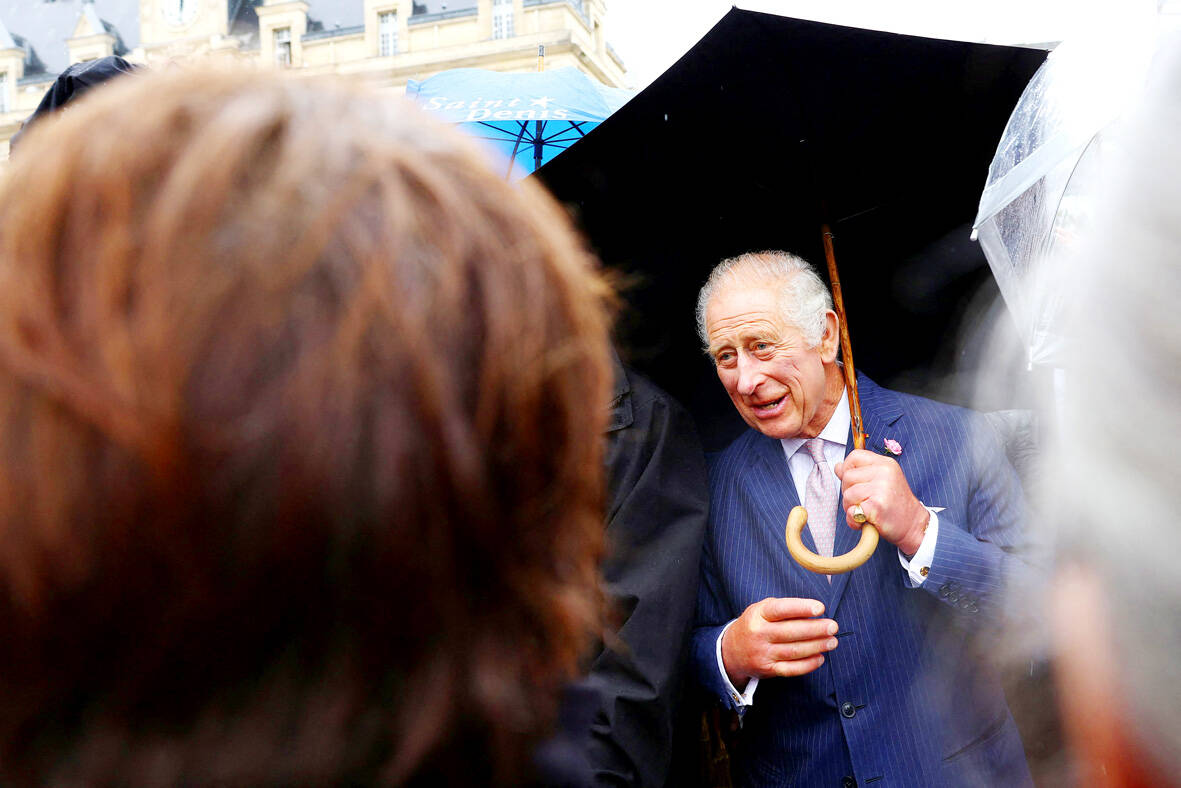What will become of the royal family? That is a question people have been asking since the regime change of last year. What sort of a state has that family got itself into? Can it survive in this form? The Queen Mother must be spinning in her grave, people think. The late Queen must have already been spinning as she was lowered into hers. All the moldering bones of their hundreds of dead relatives, clustered at Westminster and Windsor but also dotted all over the place — Gloucester, Worcester, Reading, various places in Normandy, that car park in Leicester — must all be revolving with such vigor that, as a subterranean energy source, it represents a viable alternative to fracking.
The public rift between William and Harry (with the latter emigrating alongside his wife amid talk of vindictive and racist treatment by family and courtiers, and then selling a tell-all book about it), the festering wound of Prince Andrew’s reputation and the king’s bad-temperedness about his pen all seem to show that royal dignity and probity have disappeared. It’s a family riddled with marital infidelity and divorce. A long and noble tradition is foundering under the glare of the Internet age.
“Why is this happening?” people ask.

Photo: AP
It’s the wrong question. Why is what happening? Frankly, this is all the late Queen’s fault. She was so supernaturally humble. Despite the context into which she was thrust at a very young age, which was one of overt glory, one where people were obliged almost to worship her or it was a breach of protocol, she kept an amazingly firm lid on her self-esteem. To be portrayed to the country and the world as so important and yet be able to walk into every room without seeming arrogant, despite the presence of hundreds of people starting to bow and scrape, is a unique gift. Her seven decades spent projecting nothing but duty and humility are not traditional. They are a massive outlier. Following that is like sticking Pete Doherty on after Bing Crosby.
The modern royals may provide a few scandals and embarrassments for the public to enjoy or condemn or both, but it’s just a muted and low-key coda to the centuries of humiliation, incompetence, criminality and failure exhibited by their far more powerful predecessors. Complaining “What sort of role models are these?” of the royal family is like walking into a diner and asking: “What sort of a health food store is this?”
UNDIGNIFIED ROYALS

Photo: Reuters
Kingship, despite the crown, robes, processions, coaches, trumpets and anthems, has often been an undignified activity — all the more so because it’s supposed to be dignified. Throughout the middle ages, our rulers supposedly had the endorsement of God, which made their failures all the more humiliating. King Alfred, the first king to lay claim to ruling the English as a people and the only English king to have been issued with the epithet “Great,” nevertheless spent a large part of his early reign hiding from the Vikings in a bog — by which I mean a marsh.
A later ruler, King Stephen, owed his throne to the time he spent quivering in a bog — and in this case I mean a privy. Had he, as an ambitious minor prince, not suffered a sudden, violent bout of food poisoning while on board a ship in Barfleur harbor in 1120, he wouldn’t have disembarked before it headed into the Channel and sank. Everyone on the ship died except for a solitary Norman butcher, and among the watery dead was the heir to the throne. So, when King Henry I died 15 years later, Stephen’s path to kingship had been cleared by diarrhea. He hurried to Westminster and got himself crowned, then had one of the most unsuccessful reigns in English history, entirely dominated by a savage civil war.
Perhaps the most undignified English king, though, was John. The extent of his indignity was a surprise to me when I was researching my new book about the kings and queens of England, because posterity has focused so much on how bad he was — bad as in dastardly. And he was dastardly — dishonest and brutal. During the reign of his predecessor, his elder brother Richard the Lionheart, he tried to steal the throne by pretending Richard was dead. Once Richard had genuinely died, he murdered the only rival claimant, his nephew Arthur, possibly with his bare hands, which feels like unnecessary attention to detail.
But the most startling fact about him was what an enormous loser he was. He was spectacularly unsuccessful, inheriting England, Ireland and most of France but then losing control of almost all of it within two decades. Perhaps his most ridiculous moment came in 1205 when, having lost most of his French lands, he organized a massive expedition to try to get them back which, at the 11th hour, the entire English aristocracy refused to join. They didn’t fancy it so they stayed put. An incandescent John with, one imagines, red face and crown askew, boarded the ship anyway and sailed out into the Channel to wait for them. But they didn’t come and after a while he had to sail back and style it out.
MARITAL FIDELITY
As with dignity, there is nothing royal about marital fidelity. Henry I, whose only legitimate son died in that shipwreck I mentioned, had nearly 30 children out of wedlock: 28 or 29 — something like that. Nobody’s quite sure of the number and it’s not clear whether that fact has been lost in the intervening centuries or whether the king himself didn’t know. Henry II’s infidelities so enraged his wife, Eleanor of Aquitaine, that she incited their sons into civil war just to wind him up. Henry VIII had many affairs as well as many marriages. It was when he developed a crush on Anne Boleyn but she refused to have sex with him out of wedlock that he had to trigger the English Reformation in order to establish a religion in which he could annul his current marriage and then marry her, get bored and have her head chopped off.
The intensity of intra-familial hatred in many periods of royal history makes the William and Harry rift look like a tersely raised eyebrow over a Boxing Day game of Trivial Pursuit. Not to be outdone by John, who murdered his nephew, Richard III murdered two nephews. Henry IV had his first cousin Richard II starved to death. In 1036, King Harold Harefoot had his step-brother Alfred blinded. Four years later, when Harold himself was dead, the new king, his half-brother Harthacnut, took revenge on Alfred’s behalf: he had Harold’s body dug up, beheaded and then chucked in a ditch.
CONQUEST (SORT OF)
But this ruthlessness, while showing ambition and vigor, was no barrier to incompetence or vainglorious delusion. For most of the middle ages from the Norman Conquest onwards, the kings of England were obsessed with acquiring or re-acquiring large sections of France. They went so far as to claim that they were in fact the rightful kings of France despite all the evidence to the contrary and repeatedly threw all their resources into mounting military expeditions to ruin the lives of thousands of innocent French residents which achieved, in even the medium term, precisely nothing.
If they were lucky, the expeditions were just short-lived astronomically expensive failures. But the real nightmare was when they seemed briefly to succeed, as happened under Edward III and Henry V. Dazzling victories were won, albeit at horrendous human cost, and the illusion was fleetingly conjured up that somehow the python that was England could swallow the Renault 5 that was France. You or I could have told them it was impossible — against the laws of physics — but, drunk on notions of regal greatness and their divine right, they bought into the notion again and again.
Victories such as Crecy or Poitiers had the same unbalancing psychological effect as when a journey somewhere goes much more quickly than expected. You never forget that triumphantly short travel time and it causes unshakable and unrealistic transport optimism for years afterwards, resulting in dozens of late arrivals. In the same way, a victory such as Agincourt fatally skewed English expectations of military success with repeatedly bleak consequences.
The psychological impact of this was particularly tough on Henry VI and, at the news of the collapse of England’s position in France, he too collapsed and was reduced to an inert blob, needing to be fed and washed and moved about for over a year. Worryingly the country was better governed during that year than at any other time during the reign.
The medieval monarchy is a succession of brutes and fools, with the occasional foolish brute and one or two ruthlessly efficient tyrants. They fought, they fornicated, they murdered and they usually failed. Fundamentally that is the royal tradition. It would be entirely inappropriate if today’s constitutional monarchy — which is there as a picturesque reminder of our action-packed past, of the wrong-headed chaos the country emerged from — didn’t faintly reflect that. But the answer to the question “What has become of the royal family?” is that they’ve calmed down a lot. Frankly, I’d rather even Prince Andrew was king than any of those psycho Plantagenets.

The Democratic Progressive Party (DPP), Chinese Nationalist Party (KMT), and the country’s other political groups dare not offend religious groups, says Chen Lih-ming (陳立民), founder of the Taiwan Anti-Religion Alliance (台灣反宗教者聯盟). “It’s the same in other democracies, of course, but because political struggles in Taiwan are extraordinarily fierce, you’ll see candidates visiting several temples each day ahead of elections. That adds impetus to religion here,” says the retired college lecturer. In Japan’s most recent election, the Liberal Democratic Party lost many votes because of its ties to the Unification Church (“the Moonies”). Chen contrasts the progress made by anti-religion movements in

Taiwan doesn’t have a lot of railways, but its network has plenty of history. The government-owned entity that last year became the Taiwan Railway Corp (TRC) has been operating trains since 1891. During the 1895-1945 period of Japanese rule, the colonial government made huge investments in rail infrastructure. The northern port city of Keelung was connected to Kaohsiung in the south. New lines appeared in Pingtung, Yilan and the Hualien-Taitung region. Railway enthusiasts exploring Taiwan will find plenty to amuse themselves. Taipei will soon gain its second rail-themed museum. Elsewhere there’s a number of endearing branch lines and rolling-stock collections, some

This was not supposed to be an election year. The local media is billing it as the “2025 great recall era” (2025大罷免時代) or the “2025 great recall wave” (2025大罷免潮), with many now just shortening it to “great recall.” As of this writing the number of campaigns that have submitted the requisite one percent of eligible voters signatures in legislative districts is 51 — 35 targeting Chinese Nationalist Party (KMT) caucus lawmakers and 16 targeting Democratic Progressive Party (DPP) lawmakers. The pan-green side has more as they started earlier. Many recall campaigns are billing themselves as “Winter Bluebirds” after the “Bluebird Action”

Last week the State Department made several small changes to its Web information on Taiwan. First, it removed a statement saying that the US “does not support Taiwan independence.” The current statement now reads: “We oppose any unilateral changes to the status quo from either side. We expect cross-strait differences to be resolved by peaceful means, free from coercion, in a manner acceptable to the people on both sides of the Strait.” In 2022 the administration of Joe Biden also removed that verbiage, but after a month of pressure from the People’s Republic of China (PRC), reinstated it. The American